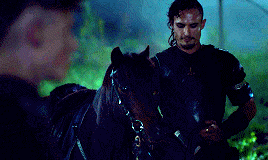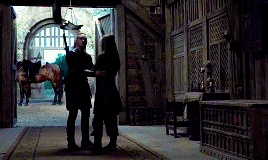Hero Of Ferelden And The Inquisitor: I Have Been Dealt A Cruel Hand. Fate Has Me Twisted Into An Order
Hero of Ferelden and The Inquisitor: I have been dealt a cruel hand. Fate has me twisted into an Order to fight ancient Evil that threatens the whole of humanity.
Rook and Hawke: So, it's started with a dwarf hiring me to do a job....
More Posts from Insomniactiefling and Others

Grey Warden Alistair Theirin is sponsored by Redcliffe Parmesan and many sketches are taken of him posing with large wheels of cheese
(based on x)
How the Chantry (and Orlais) Turned Kirkwall into a Police State
One aspect of the Dragon Age series that I’ve always found odd is the way in which rather crucial political and historical context surrounding major conflicts the player must decide tends to be relegated to codices, outside materials (e.g., books), and optional dialogue with minor characters… meaning that many if not most players don’t seem to end up actually seeing it. Wicked Eyes and Wicked Hearts (Dragon Age Inquisition) in particular has become somewhat notorious for what it left out, but it’s far from unusual.
With regard to Dragon Age II, there’s a popular perception among fans that the troubles in Kirkwall can be attributed almost entirely to rogue behavior on the part of Knight-Commander Meredith and various evil blood mages. This is understandable given the overall narrative framing and Bioware’s aforementioned problem of making key context very easy to miss. But once we take a look at the full picture, it ought to be clear that the Chantry did not simply “fail” in their responsibilities towards the mages or towards the citizens of Kirkwall more broadly — they actively created and maintained the very nightmare they later professed to be dismayed about.
Moreover, despite the running Mages vs. Templars theme, the mages were hardly the only one’s who suffered under Meredith’s rule. Indeed, Kirkwall endured a brutal 16-year-long dictatorship (9:21-9:37 Dragon) that came into being courtesy of the Chantry and the Orlesian empire and only fell due to the mage rebellion.
Here I’ll describe in detail (with sources and citations) the story of how the Chantry turned Kirkwall into a police state and one that ultimately descended into what the writers themselves termed “genocide.”
Keep reading
"lol isn't it funny how there are hardly any dragons in the dragon age games! and how dragons are barely relevant to the story lol" Anyway isn't it funny how the true importance of dragons in Dragon Age has been such a slow-burn concept despite the final boss of the first game being a dragon? One of the most important recurring NPCs in the series transforms into a dragon and is associated with dragon imagery. The big repeated world-ravaging catastrophes are led by corrupted dragons. These dragons and said catastrophes are connected to at least three of the world's major religions. The current age was named the "Dragon Age" because of the resurgence of dragons after they were thought to be extinct. A daughter of the aforementioned recurring character is revealed to have been deliberately breeding dragons to bring them back, and tells us that "the blood of dragons is the blood of the world." A major character from ancient times finds the idea of all the old god dragons being killed really upsetting and hasn't told us why. We found out in the last game that dragons have an unusual resistance to that world-ravaging catastrophe. There are only a couple old god dragons left. Dragons aren't always in the foreground of the story, but they're always there, they've always been there, in the background or just offscreen, hiding, sleeping, deep under the surface, waiting.
WHAT IF all those wolf statues we see in the game are not sculptures representing Fen'harel, but ordinary wolves who had the misfortune of somehow displeasing Solas, and he turned them into stone…
-
 amoaliquis liked this · 1 week ago
amoaliquis liked this · 1 week ago -
 cdarcher123 liked this · 1 week ago
cdarcher123 liked this · 1 week ago -
 shadowcrow liked this · 2 weeks ago
shadowcrow liked this · 2 weeks ago -
 rheeves liked this · 2 weeks ago
rheeves liked this · 2 weeks ago -
 lionessreturns liked this · 2 weeks ago
lionessreturns liked this · 2 weeks ago -
 mysteriousnewt liked this · 2 weeks ago
mysteriousnewt liked this · 2 weeks ago -
 gokelpy liked this · 2 weeks ago
gokelpy liked this · 2 weeks ago -
 frykusnemalekotki liked this · 2 weeks ago
frykusnemalekotki liked this · 2 weeks ago -
 shadow-pancake9 reblogged this · 2 weeks ago
shadow-pancake9 reblogged this · 2 weeks ago -
 shadow-pancake9 reblogged this · 2 weeks ago
shadow-pancake9 reblogged this · 2 weeks ago -
 maskingme liked this · 2 weeks ago
maskingme liked this · 2 weeks ago -
 bhaalenciaga reblogged this · 2 weeks ago
bhaalenciaga reblogged this · 2 weeks ago -
 dumpstersoul reblogged this · 2 weeks ago
dumpstersoul reblogged this · 2 weeks ago -
 screenem liked this · 2 weeks ago
screenem liked this · 2 weeks ago -
 blaze-ralabast liked this · 3 weeks ago
blaze-ralabast liked this · 3 weeks ago -
 asulnarosas liked this · 3 weeks ago
asulnarosas liked this · 3 weeks ago -
 starshineartlover liked this · 3 weeks ago
starshineartlover liked this · 3 weeks ago -
 anovaart liked this · 3 weeks ago
anovaart liked this · 3 weeks ago -
 like4ratspretendingtobeatoaster liked this · 3 weeks ago
like4ratspretendingtobeatoaster liked this · 3 weeks ago -
 marbleharbor reblogged this · 3 weeks ago
marbleharbor reblogged this · 3 weeks ago -
 marbleharbor liked this · 3 weeks ago
marbleharbor liked this · 3 weeks ago -
 i-am-an-atomic-bomb liked this · 3 weeks ago
i-am-an-atomic-bomb liked this · 3 weeks ago -
 inqstampx liked this · 3 weeks ago
inqstampx liked this · 3 weeks ago -
 salacious-b-dumb liked this · 3 weeks ago
salacious-b-dumb liked this · 3 weeks ago -
 iidontevenknowanymoreii liked this · 4 weeks ago
iidontevenknowanymoreii liked this · 4 weeks ago -
 another-bryk-in-the-wall reblogged this · 4 weeks ago
another-bryk-in-the-wall reblogged this · 4 weeks ago -
 seascrypted liked this · 4 weeks ago
seascrypted liked this · 4 weeks ago -
 littlemenomaru liked this · 1 month ago
littlemenomaru liked this · 1 month ago -
 justcallmecaelus reblogged this · 1 month ago
justcallmecaelus reblogged this · 1 month ago -
 justcallmecaelus liked this · 1 month ago
justcallmecaelus liked this · 1 month ago -
 delectablyverynacho liked this · 1 month ago
delectablyverynacho liked this · 1 month ago -
 notsosoupy liked this · 1 month ago
notsosoupy liked this · 1 month ago -
 physicist-pi reblogged this · 1 month ago
physicist-pi reblogged this · 1 month ago -
 didko-lysyy liked this · 1 month ago
didko-lysyy liked this · 1 month ago -
 lanolynn liked this · 1 month ago
lanolynn liked this · 1 month ago -
 ichoselifecanihavearefund reblogged this · 1 month ago
ichoselifecanihavearefund reblogged this · 1 month ago -
 puddle-of-creativity liked this · 1 month ago
puddle-of-creativity liked this · 1 month ago -
 vargamour liked this · 1 month ago
vargamour liked this · 1 month ago -
 atzicat liked this · 1 month ago
atzicat liked this · 1 month ago -
 icedsaber4 liked this · 1 month ago
icedsaber4 liked this · 1 month ago -
 mymidnightblues liked this · 1 month ago
mymidnightblues liked this · 1 month ago -
 parsimoniousbitch reblogged this · 1 month ago
parsimoniousbitch reblogged this · 1 month ago -
 fanfiction-artist-prototype reblogged this · 1 month ago
fanfiction-artist-prototype reblogged this · 1 month ago -
 mr-seamonster liked this · 1 month ago
mr-seamonster liked this · 1 month ago -
 one-gay-sparrow liked this · 1 month ago
one-gay-sparrow liked this · 1 month ago -
 mifantasyworld liked this · 1 month ago
mifantasyworld liked this · 1 month ago -
 clownie441 liked this · 1 month ago
clownie441 liked this · 1 month ago -
 boozieru liked this · 1 month ago
boozieru liked this · 1 month ago -
 crystallabyrinth liked this · 1 month ago
crystallabyrinth liked this · 1 month ago -
 hessufc liked this · 1 month ago
hessufc liked this · 1 month ago









































